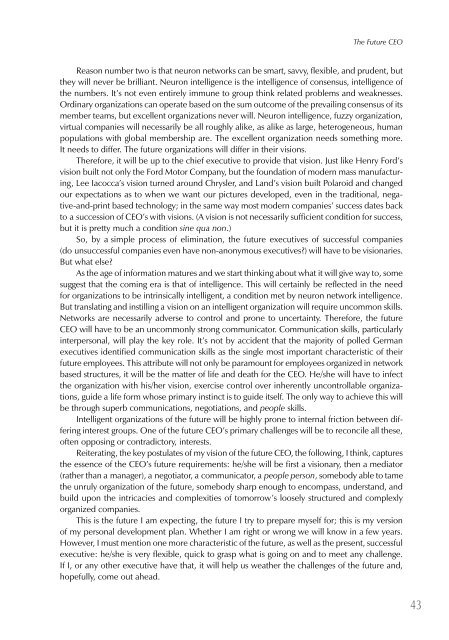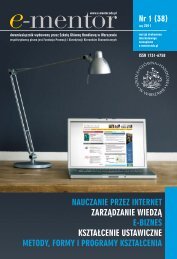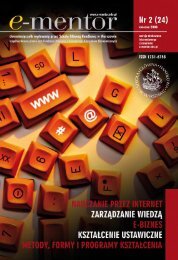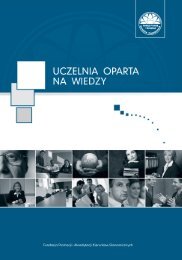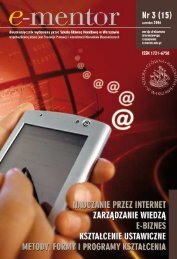Przerażony kameleon - eseje o przyszłości zarządzania - E-mentor
Przerażony kameleon - eseje o przyszłości zarządzania - E-mentor
Przerażony kameleon - eseje o przyszłości zarządzania - E-mentor
- TAGS
- kameleon
- eseje
- e-mentor.edu.pl
Create successful ePaper yourself
Turn your PDF publications into a flip-book with our unique Google optimized e-Paper software.
The Future CEO<br />
Reason number two is that neuron networks can be smart, savvy, flexible, and prudent, but<br />
they will never be brilliant. Neuron intelligence is the intelligence of consensus, intelligence of<br />
the numbers. It’s not even entirely immune to group think related problems and weaknesses.<br />
Ordinary organizations can operate based on the sum outcome of the prevailing consensus of its<br />
member teams, but excellent organizations never will. Neuron intelligence, fuzzy organization,<br />
virtual companies will necessarily be all roughly alike, as alike as large, heterogeneous, human<br />
populations with global membership are. The excellent organization needs something more.<br />
It needs to differ. The future organizations will differ in their visions.<br />
Therefore, it will be up to the chief executive to provide that vision. Just like Henry Ford’s<br />
vision built not only the Ford Motor Company, but the foundation of modern mass manufacturing,<br />
Lee Iacocca’s vision turned around Chrysler, and Land’s vision built Polaroid and changed<br />
our expectations as to when we want our pictures developed, even in the traditional, negative-and-print<br />
based technology; in the same way most modern companies’ success dates back<br />
to a succession of CEO’s with visions. (A vision is not necessarily sufficient condition for success,<br />
but it is pretty much a condition sine qua non.)<br />
So, by a simple process of elimination, the future executives of successful companies<br />
(do unsuccessful companies even have non-anonymous executives?) will have to be visiona ries.<br />
But what else?<br />
As the age of information matures and we start thinking about what it will give way to, some<br />
suggest that the coming era is that of intelligence. This will certainly be reflected in the need<br />
for organizations to be intrinsically intelligent, a condition met by neuron network intelligence.<br />
But translating and instilling a vision on an intelligent organization will require uncommon skills.<br />
Networks are necessarily adverse to control and prone to uncertainty. Therefore, the future<br />
CEO will have to be an uncommonly strong communicator. Communication skills, particularly<br />
interpersonal, will play the key role. It’s not by accident that the majority of polled German<br />
executives identified communication skills as the single most important characteristic of their<br />
future employees. This attribute will not only be paramount for employees organized in network<br />
based structures, it will be the matter of life and death for the CEO. He/she will have to infect<br />
the organization with his/her vision, exercise control over inherently uncontrollable organizations,<br />
guide a life form whose primary instinct is to guide itself. The only way to achieve this will<br />
be through superb communications, negotiations, and people skills.<br />
Intelligent organizations of the future will be highly prone to internal friction between differing<br />
interest groups. One of the future CEO’s primary challenges will be to reconcile all these,<br />
often opposing or contradictory, interests.<br />
Reiterating, the key postulates of my vision of the future CEO, the following, I think, captures<br />
the essence of the CEO’s future requirements: he/she will be first a visionary, then a mediator<br />
(rather than a manager), a negotiator, a communicator, a people person, somebody able to tame<br />
the unruly organization of the future, somebody sharp enough to encompass, understand, and<br />
build upon the intricacies and complexities of tomorrow’s loosely structured and complexly<br />
organized companies.<br />
This is the future I am expecting, the future I try to prepare myself for; this is my version<br />
of my personal development plan. Whether I am right or wrong we will know in a few years.<br />
However, I must mention one more characteristic of the future, as well as the present, successful<br />
executive: he/she is very flexible, quick to grasp what is going on and to meet any challenge.<br />
If I, or any other executive have that, it will help us weather the challenges of the future and,<br />
hopefully, come out ahead.<br />
43


